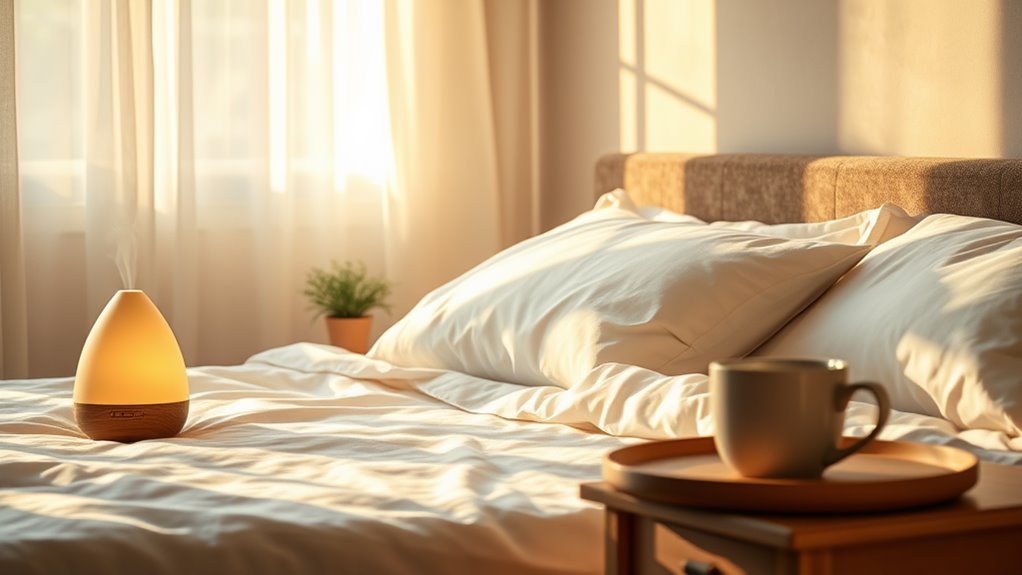Deep Sleep Every Night – Reset Your Circadian Rhythm Naturally
To achieve deep sleep every night, it’s vital to reset your circadian rhythm naturally. Start by maintaining a consistent sleep schedule and exposing yourself to natural light, which signals your body to wake up. Incorporate relaxation techniques and enjoy calming herbal teas like chamomile before bed. Creating a sleep-friendly environment by minimizing noise and light will further enhance your rest. Small lifestyle changes can significantly improve your sleep quality, and there’s more to discover on this journey.
Understanding Circadian Rhythms
Understanding your circadian rhythm is crucial, especially when you’re feeling out of sync. Your body operates on a natural cycle, influencing sleep and energy levels.
To achieve a natural circadian rhythm reset, focus on consistent sleep schedules and exposure to natural light. These simple adjustments can help you realign your body clock, promoting better rest and overall well-being.
Embrace this process for optimal health.
The Importance of Deep Sleep
Deep sleep plays a vital role in restoring both your body and mind, making it essential for overall health.
During this restorative phase, your brain consolidates memories, and your body repairs tissues and muscles.
A consistent deep sleep routine not only enhances your mood but also supports cognitive function, immune health, and metabolic processes.
Prioritizing this sleep stage can significantly improve your overall well-being. Additionally, incorporating essential oils like lavender into your nighttime routine can further enhance relaxation and promote better sleep quality.
Natural Methods to Reset Your Circadian Rhythm
Resetting your circadian rhythm can be achieved through simple, natural methods that fit seamlessly into your daily routine.
By incorporating sunlight exposure, sticking to a consistent sleep schedule, and practicing relaxation techniques before bed, you can improve your overall sleep quality. Additionally, enjoying herbal teas like chamomile tea can enhance relaxation and support a tranquil evening, further aiding in the rhythm reset.
Let’s explore these strategies to help you reclaim your natural sleep-wake cycle.
Sunlight Exposure Strategies
To effectively realign your circadian rhythm, harnessing the power of sunlight can be a transformative strategy.
Start your day by stepping outside for at least 20 minutes in natural light. This exposure signals your body that it’s time to wake up, helping to regulate hormone production.
Prioritize morning sun, as it strengthens your internal clock and enhances overall well-being.
Consistent Sleep Schedule
Establishing a consistent sleep schedule can be a game-changer for your circadian rhythm. By going to bed and waking up at the same time daily, you signal your body when to rest. This helps regulate your internal clock, improving sleep quality and overall health.
Aim for seven to nine hours of sleep each night to enhance your energy and mood throughout the day.
Relaxation Techniques Before Bed
While you might feel tempted to dive into your evening routine full steam ahead, incorporating relaxation techniques before bed can profoundly impact your circadian rhythm.
Consider practices like deep breathing, gentle yoga, or meditation to calm your mind.
Dimming the lights and reading a book can also help.
These simple methods signal your body it’s time to wind down, promoting better sleep.
Creating a Sleep-friendly Environment
Creating a sleep-friendly environment is crucial for restoring your circadian rhythm.
You’ll want to optimize bedroom darkness, control noise levels, and adjust the room temperature for the best results.
Optimize Bedroom Darkness
To truly enhance your sleep quality, ensuring optimal darkness in your bedroom is essential.
Here are four ways to create that perfect sleep environment:
- Use blackout curtains to block outside light.
- Turn off electronic devices to reduce blue light exposure.
- Employ sleep masks for additional darkness.
- Cover any unwanted light sources, such as alarm clocks.
This sets the stage for restorative sleep.
Control Noise Levels
How can you foster a truly restful sleep environment?
Start by controlling noise levels. Consider using earplugs, white noise machines, or calming sound apps to drown out disruptive sounds.
If possible, soundproof your bedroom with heavy curtains or rugs to absorb noise.
You deserve a peaceful atmosphere that promotes deep sleep, so make it a priority to create a serene space.
Adjust Room Temperature
While you may not think about it often, room temperature plays a crucial role in achieving a restful night’s sleep. A comfortable environment can transform your nights.
To create the perfect atmosphere, consider these factors:
- Set your thermostat between 60-67°F for optimal sleep.
- Use breathable bedding.
- Block drafts and humidity.
- Experiment with cooling fans.
A few adjustments can make all the difference.
Incorporating Healthy Lifestyle Habits
Many people struggle with maintaining a consistent circadian rhythm, but incorporating healthy lifestyle habits can make a significant difference. Focus on balanced nutrition, regular exercise, and mindful relaxation techniques. Limit screen time before bed and establish a calming nighttime routine. Incorporating natural sleep remedies like chamomile tea can further enhance your sleep quality and help reset your internal clock, leading to deeper, more restorative sleep each night. These small changes can enhance your sleep quality and help reset your internal clock, leading to deeper, more restorative sleep each night.
Monitoring Your Progress for Better Sleep
Are you aware of how tracking your sleep patterns can lead to more restful nights? Monitoring your progress sheds light on your habits and helps you make necessary adjustments.
Consider these key benefits:
- Identify sleep trends.
- Recognize factors affecting your slumber.
- Celebrate improvements in your sleep quality.
- Stay motivated with tangible data to keep you accountable.
Embrace this journey toward better sleep!





